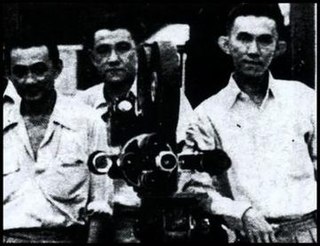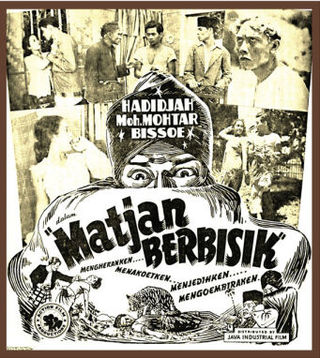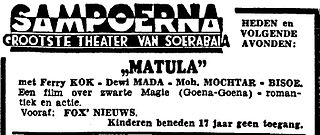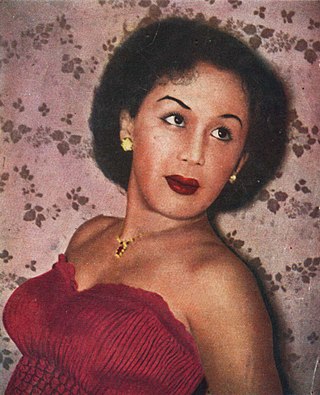
The Teng Chun, also known by his Indonesian name Tahjar Ederis, was an Indonesian film producer. Born to a rich businessman, The became interested in film while still a youth. After a period as an exporter, in 1930 he established Cino Motion Picture to produce films in the Dutch East Indies. In a little over a decade he and his company had released at least 31 films, including some of the country's first talkies. Although he experienced a brief resurgence during the 1950s, after Indonesia became independent, he spent the last years of his life as an English teacher.

Kartinah is a now-lost 1940 romance film from the Dutch East Indies that was written and directed by Andjar Asmara. The film, Andjar's directorial debut, follows a nurse and her superior as they fall in love in the Air Raid Preparation team. Produced by The Teng Chun's New Java Industrial Film, Kartinah was heavily subsidised by the country's government and through product placement. Although it was a critical failure, the new actors signed with the studio for Kartinah gave New Java Industrial Film increased production capabilities.

The Wong brothers were three ethnic Chinese film directors and cameramen active in the cinema of the Dutch East Indies. The sons of an Adventist preacher, the brothers – Nelson (1895–1945), Joshua (1906–1981), and Othniel (1908–1986) – received much of their education in the United States before going to Shanghai and establishing The Great Wall Productions.

Djantoeng Hati is a 1941 film from the Dutch East Indies directed by Njoo Cheong Seng. A tragedy warning against modernity, it starred A. Sarosa, Rr Anggraini, and Ariati
Sam Pek Eng Tay is a 1931 film directed and produced by The Teng Chun and released in the Dutch East Indies. It is based on the Chinese legend The Butterfly Lovers, which follows the doomed love between a rich girl and a commoner boy. The film was a commercial success, inspiring The Teng Chun to direct several further films based on Chinese mythology. The name derives from the given names of the legend's two main characters, Liang Shanbo (梁山伯) and Zhu Yingtai (祝英台).

Astaman also known as Tirtosari, was an Indonesian actor active from the 1910s until the mid-1970s. He was a leading actor in the influential theatre company Dardanella and, after entering the film industry with 1940s Kartinah, acted in 43 films.

Oh Iboe is a 1938 film from the Dutch East Indies. Directed by The Teng Chun and starring Lo Tjin Nio and Bissu, it followed a suffering of a family after the matriarch dies. The film was one of several produced by The which dealt with modern stories, following Gadis jang Terdjoeal the year before. It is likely lost.

Matjan Berbisik is a 1940 film from the Dutch East Indies which was directed by Tan Tjoei Hock and produced by The Teng Chun. Starring Hadidjah and Mohamad Mochtar, the film follows two men who are raised as brothers and compete for the love of the same woman. A copy of the black-and-white film, which featured keroncong music, is stored at Sinematek Indonesia.

Srigala Item is a 1941 film from the Dutch East Indies that was directed by Tan Tjoei Hock and produced by The Teng Chun for Action Film. Starring Hadidjah, Mohamad Mochtar, and Tan Tjeng Bok, the film's plot – inspired by Zorro – follows a young man who became a masked vigilante to take revenge against his conniving uncle. Srigala Item was a commercial success, which Misbach Yusa Biran credits to the plot's use for escapism. A copy of the black-and-white film, which featured kroncong music, is stored at Sinematek Indonesia.
Noesa Penida is a 1941 film from the Dutch East Indies which was directed by Andjar Asmara and produced by The Teng Chun of Java Industrial Film. It tells of a love triangle between two brothers, born to a commoner, and a noble woman.
Elang Darat is a 1941 film from the Dutch East Indies which was directed by Inoe Perbatasari and produced by The Teng Chun for Jacatra Film. A detective film, it follows a man who comes to a village to track the villainous bandit known only as "Elang Darat".
Djaoeh Dimata is a 1948 film from what is now Indonesia written and directed by Andjar Asmara for the South Pacific Film Corporation (SPFC). Starring Ratna Asmara and Ali Joego, it follows a woman who moves to Jakarta to find work after her husband is blinded in an accident. SPFC's first production, Djaoeh Dimata took two to three months to film and cost almost 130,000 gulden.

Matula is a 1941 film from the Dutch East Indies which was directed by Tan Tjoei Hock and produced by The Teng Chun of Java Industrial Film. The black-and-white film, now likely lost, follows a young man who tries to give a woman's soul to a shaman as payment for being made handsome.

Roesia si Pengkor, also known as Hadji Saleh, is a 1939 film from the Dutch East Indies which was directed and produced by The Teng Chun for his Java Industrial Films. Starring Da'ing, Bissu, and Hadidjah, this black-and-white film followed a young woman who is saved from deceptive suitors by her beloved and a man known as "Si Pengkor".

Si Gomar is a 1941 film from the Dutch East Indies which was written and directed by Tan Tjoei Hock and produced by The Teng Chun. Starring Hadidjah, Mohamad Mochtar, and Tan Tjeng Bok, the movie follows a brother and sister who are separated by robbers and almost marry before their cousin recognises them.

Ali Joego was a stage and film actor and director active in the Dutch East Indies and Indonesia. During his twenty-year career he appeared in thirty films and directed seven.

Boes Boestami was an Indonesian journalist and film actor. He was mostly known for his comedic roles.

Saputangan is a 1949 romance film from what is now Indonesia. Directed by Fred Young and starring Chatir Harro, Noorsini, and Astaman, it follows a young doctor who, after his fiancée is blinded in an automobile accident, becomes an optometrist and restores her sight.

Roostijati was an Indonesian actress, soldier, radio announcer, director, athlete, teacher, and make-up artist. She was the sister of actor Djoni Sundawa and was the second Indonesian women director after Ratna Asmara by directing Genangan Air Mata (1955), and was one of the six Indonesian women director before 1998. She was the part of Classical Indonesian Cinema.

Lenggang Djakarta is a 1953 Indonesian drama film directed by M. Arief and starred Bambang Hermanto, Mimi Mariani, and Ismah BS.

















